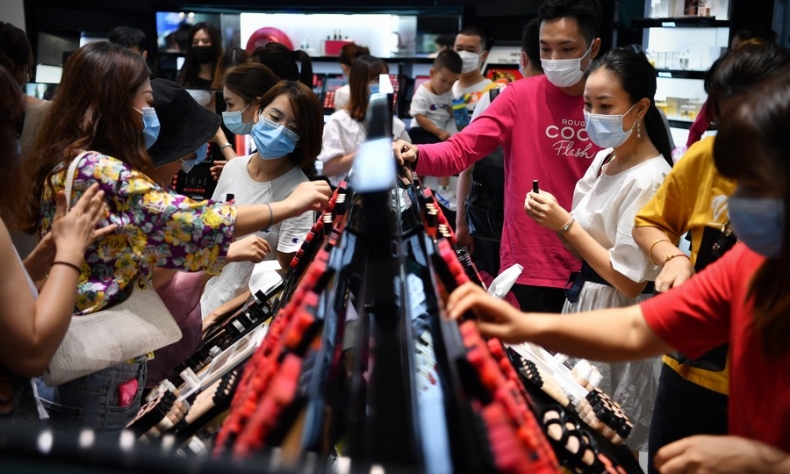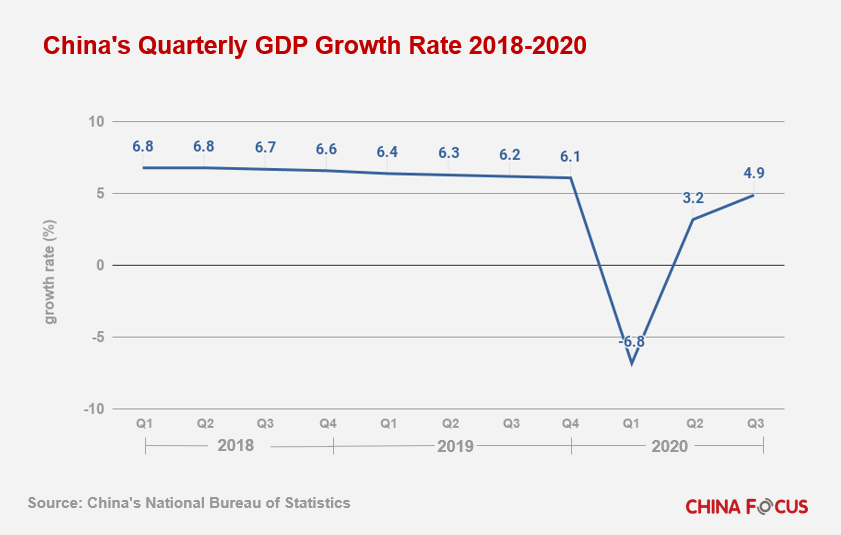No Cause for Envy: China’s Growth Is Good for the World

I was in China from January through March. I can say that, from firsthand experience, the Chinese people made great sacrifices to choke off an increase in the spread of the virus.
Can countries recover from the COVID-19 pandemic and return to economic growth?
China’s third quarter GDP results appear to show the answer is yes, they can.
The economy grew at a rate of 4.9% in this quarter. That number is higher than any country has posted in the second-quarter, but most countries have not yet released their third-quarter growth result so no direct comparison is possible yet.
China’s growth was powered by manufacturing returning to virtual normality and double-digit percentage increases in both exports and imports. It was made possible by aggressive efforts to bring the virus under control, starting with lockdowns in the spring, then a gradual reopening based upon the latest information from testing and health data.
Quarantine requirements are still being observed for people arriving into the country, and masks are still being worn. When a number of cases were detected in Qingdao, 9 million local residents were immediately tested.
I was in China from January through March. I can say that, from firsthand experience, the Chinese people made great sacrifices to choke off an increase in the spread of the virus. All businesses but food and drug stores were closed for a month or longer. Everybody chose to limit their time away from home. Some cities were even put under total quarantine. Sick people, and people in villages and neighborhood communities who arrived from different cities truly observed quarantine. Local community volunteers delivered food to their doors.
The point is that China put in the effort to overcome the coronavirus.
Even Western columnists and media outlets with critical headlines are not questioning that China took strong measures. “Since China fought off the outbreak,” an Associated Press article declared, “Chinese firms have taken advantage of their good fortune while their global rivals grapple with reduced manufacturing capacity.”
Envy is a human emotion, I guess, but the right way to channel that is to work hard to try to obtain a desirable result. In this case, Western countries should be looking for lessons at how they can fight their own outbreak and get their economies going.
Instead, there are more articles attacking China for growing its economy! Edward Lucas of the London Daily Mail wrote that it was “galling” to see China bouncing back. The Economist wrote that the “political gulf between China and the world is set to widen” due to the “asymmetrical success” of China’s response, which the magazine predicted would breed “foreign anger.”
It is, as critics of the Western media point out, a case where the “free press” will portray China negatively no matter what the circumstance. Economic growth, a cause for celebration, is cast in a nefarious light and China’s success is presented as a threat to the world. But when China’s economy contracted by 6% in the first quarter, prominent media figures suggested it was “China’s Chernobyl.”
Yet, China’s economic growth is good news for the world. Beyond the fact that it represents millions of people finding jobs and millions of people having more money to spend, that growth also means direct benefits for the economies of foreign countries. As economists quoted by a CNBC article said, “Asia cannot prosper unless China prospers.”
As the world’s second largest market for imports, China’s prosperity is crucial for companies around the world to sell their goods. China is also a major source of the raw materials companies rely on to manufacture their own products.
Beyond that, envy is wrong for another reason: It is simply not true that China is the only country that has discovered the way to overcome the coronavirus. Many other countries where most people wear masks and have mandatory quarantine regulations have also cut the rate of viral transmission so low that they were able to safely open most businesses. That includes South Korea, Vietnam, New Zealand, and Australia.
It might be true that the American political system does not allow for the kind of decisive action to test everyone in a city, but neither does South Korea or Australia. Even Germany, part of the European Union, has a death rate that is six times less than that of the United States.
Quarterly economic numbers are also increasing in some parts of the world – even in countries that did not control the coronavirus. The third-quarter numbers in the U.S. will not be officially reported for a few more days, but CNN reports that economists expect 7% quarterly growth. However, that would still mean negative growth for the year.
The high-sounding number is mostly the result of consumer businesses that were closed in the second-quarter re-opening after stay-at-home orders expired. However, the envy-stoking contrast the media is seeking to portray would be more difficult to present if accurate numbers are used.
South Korea also reported positive third-quarter growth this week, at 1.9%, another success story for a country that is controlling coronavirus despite being hit early on. While lower than the projected U.S. growth rate, South Korea also didn’t suffer such a harsh downturn during the second quarter, with its economy only contracting 3.2%, so South Korea did not have much room to grow.
There’s no reason to be envious of the countries that controlled the pandemic and the countries that are growing. The world should work together on the pandemic and the economy and learn from best practices elsewhere in this evolving situation.
Mitchell Blatt is a columnist with China.org.cn.
 Facebook
Facebook
 Twitter
Twitter
 Linkedin
Linkedin
 Google +
Google +











